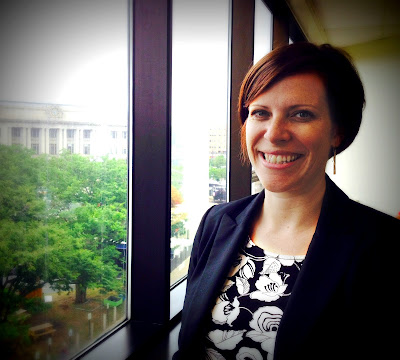 |
| Fellow Stephanie Dolamore getting an eyeful of Baltimore |
Stephanie Dolamore has a strategy for addressing residential challenges for traditionally under-served populations: first, by exploring the past, and assessing Baltimore’s issues in finding sustainable housing for people in need. Second, by getting the word out–via symposium, the classroom, or even by creating what she calls an “empathy museum” where insights into housing history can be brought to life. Dolamore is a graduate research assistant pursuing her doctorate in Public Administration at UB, and one of the fellows doing research in Langsdale Special Collections this summer (check out our interview with the other fellowship recipient, Caitlin Rathe, here.) All of this research will culminate in a program on August 31st, where Dolamore and Rathe will present “Meeting Basic Needs: Structural Inequality and Public Services in Baltimore” (4:30-5:30 p.m., Bogolmony Room, UB Student Center— mark your calendars!.) In the meantime, Stephanie agreed to give us a sneak peek at what she’s uncovered in Special Collections so far.
Where are you from, and where do you live ordinarily?
SD: I am from South Florida, but moved to Maryland in 2012. For the last two years, I have lived in downtown Baltimore with my husband. I am [also] a full-time doctoral student here at UB. I work as a Graduate Research Assistant with the College of Public Affairs and I teach GVPP201: American Government to freshman at the University. My professional background is in the human services, with my most recent experience being in higher education administration.
What’s your focus of study, and how does your research here tie into that?
SD: I am in the Doctor in Public Administration program, where I study how the areas of government function. In particular, I have research interests in organizational culture and how it influences decision making. My research with the Langsdale Fellowship ties into the work I am doing for my dissertation, where I will be looking for evidence of empathy, or a lack thereof, in the local governing bodies over affordable housing in Baltimore.
Is your research confidential? If not, what kinds of research are you hoping to accomplish with regards to this grant?
My research is not a secret! In fact, I hope it is very much the opposite and that my findings will be useful to practitioners who continue to provide housing services in Baltimore. My research this summer spans two domains:
1) I am examining the documents contained in the Thompson vs. HUD files, a landmark lawsuit in affordable housing, to study the organizational culture of the local defendant in the case (the Housing Authority of Baltimore City, HABC). I am analyzing the documents to assess the empathetic culture of HABC, modeling my work after a cultural assessments framework used for social equity.
2) In addition to generating scholarly findings, I will be producing exhibits for an empathy museum that will be used to tell the histories of people who have suffered from structural inequality in public housing. To accomplish this, I will be broadening my analysis to include a few other collections within the Langsdale Archives.
 |
| Citizens’ Planning and Housing Association (CPHA) Collection, via flickr |
What does structural inequality mean to you?
Structural inequality is the idea that many factors in society work together to promote injustice in our communities. For instance, in my project, subsidized housing services were being provided in Baltimore but they were chronically limited to certain neighborhoods, concentrating poverty with ramifications for education, transportation, food access, etc. across many generations. Understanding structural inequality is a critical step toward finding solutions that promote fairness and the only way to overturn centuries of privilege inherent in the vast majority of our societal institutions.
Any comments about our archives? Langsdale? Baltimore in general?
The Archives are a fantastic resource at the University of Baltimore and I only wish more students were encouraged to explore them as part of our studies. The diversity and organization of the collections are fantastic, and I know I will be walking away with more research questions than when I came in! Langsdale also has some of the best staff on campus and they are welcoming, helpful, and supportive of this research. I am also very honored to be a Fellow studying structural inequality in Baltimore, since the timeliness of this topic permeates through many areas of local, state, and national discourse.